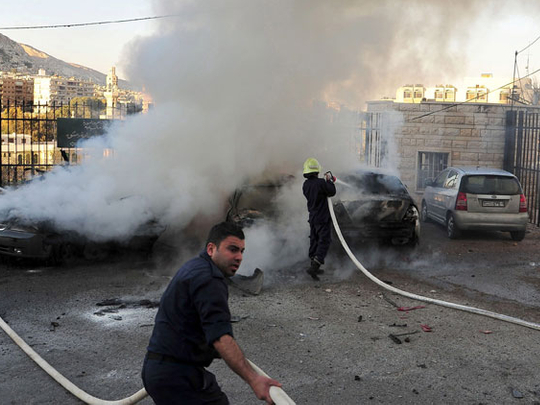
Beirut: Muath Al Khatib, the president of the Syrian National Coalition, surprised everyone when he tendered his resignation on Sunday.
Regrettably, the resignation undermined the opposition’s legitimacy and delayed various attempts to set up a transitional government, and subsequently strengthened the Baath regime in Damascus. On his Facebook page, Al Khatib wrote that specific “red lines” were crossed. A few days earlier Gassan Hitto, a fairly unknown businessman from Texas, was elected as interim prime minister of the Syrian opposition.
Many speculated that his decision to throw in the towel had a lot to do with Hitto’s appointment as well as Qatar’s influence in Syria’s affairs. Observers believed that Qatar was trying guide the direction of the opposition through its substantial financial investments in the coalition. Caught off-guard, Qatari Prime Minister Shaikh Hamad Bin Jasem Al Thani, asked Al Khatib to reconsider and invited him to sit at the vacant Syria seat at the Arab League. Furthermore, observers say that another point of contention was Hitto’s pro-Muslim Brotherhood stances and a general dominance by the Brotherhood in the National Coalition.
While Al Khatib was widely respected, many Brotherhood members from within the coalition did not consider him a “traditional Islamist” but saw him as someone who had all of Syria at heart. Many hailed his election in November last year, relieved that his unifying efforts would add a semblance of stability to the opposition which was riddled with division since its inception. It was Al Khatib who pointed out that the Alawites were not being treated justly because the state put them at the forefront of the conflict. He also criticised Islamist militants because he believed they were portraying the revolution as “extremist”.
Courageous
While the Syrian National Council was denying any atrocities committed by extremist elements, Al Khatib was courageous enough to acknowledge the crimes. He was also in favour of opening dialogue with the regime in January 2013. Although Damascus rejected talks, Al Khatib earned the scorn of hardliners within the coalition for even suggesting dialogue. He was a moderate voice who wished to avoid sectarianism that has been fuelling Syria’s two-year civil war. It became clear through his resignation, that Al Khatib was being increasingly sidelined by world powers. Despite lofty promises by the European Union to lift an arms embargo and arm Syria’s rebels, nothing yet has materialised — to which Al Khatib insisted that the Syrian people were denied the right to “defend themselves”.
In fact, on the same day that Al Khatib resigned the Free Syrian Army issued a statement that they did not recognise Hitto’s leadership, severely undermining the Coalition just ahead of Tuesday’s Arab Summit meeting. Former Syrian National Council head Burhan Galioun, liberal dissident Kamal Al Labwani and opposition member Suhair Al Attasi were equally critical of Hitto’s election, and walked out in protest.
Meanwhile, fighters on the ground expressed neutrality to Al Khatib’s resignation, saying that it did not change anything on the ground. In a simultaneous blow to the opposition, Riad Al Asa’ad, a rebel military leader who was among the first to call openly for armed insurrection against President Bashar Al Assad, was wounded by a bomb planted in his car in eastern Syria. Al Asa’ad, a leader of a now-sidelined rebel umbrella group known as the Free Syrian Army, had his right foot amputated following the blast late on Sunday, according to an activist in the town of Mayadeen where the attack took place.
Further indication of the disarray of the opposition is that hundreds of independent rebel groups are fighting in the civil war against Al Assad’s forces across the country. The UN says more than 70,000 people have been killed since the first protests in March, 2011. During the war, Al Asa’ad, who spent most of his time in a refugee camp in Turkey, never managed to build effective links with most rebel groups or provide the support that would have made them recognise him as their leader. While most fighters in Syria refer to themselves as part of the “Free Army,” those who say they follow Al Asa’ad are rare.
More recently, Al Asa’ad’s group has been superseded by the Office of the Chiefs of Staff, which is associated with the opposition Syrian National Coalition and led by General Salim Idris. That body, too, has failed to project widespread authority inside Syria, where most groups still cobble together their own funding and arms.











